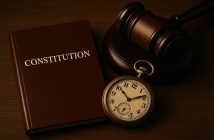NOTE
By: Alberto López Merlán
“Impeachment is a rare event; presidential impeachment is even rarer.” -Scott S. Barker [efn_note]Scott S. Barker, An overview on presidential impeachment, 47 Colo. Law. 30, 31 (2018). [/efn_note]
Introduction
Impeaching the president is not an easy task, convicting him in the impeachment trial and making him leave office is almost impossible.[efn_note]Id. (for a better understanding of the impeachment process and its history). [/efn_note] “In the 229 years of the American republic only two presidents, Andrew Johnson and William Jefferson (Bill) Clinton, have been impeached by the House of Representatives. Neither was convicted by the Senate.”[efn_note]Id. [/efn_note] The founding fathers made this process challenging for a reason. A democracy would be ill served by a constitution that allows so easily the removal of a president who was elected—through electoral college votes—by the peoples of the nation.
Recently, the 45th president of the United States, Donald J. Trump (onward, “Trump”), has been involved in a saga of events that have him on the brink of becoming the third president in U.S. history to be impeached by the House of Representatives (onward, “the House”).[efn_note]Barker, supra note 1, at 30-31. [/efn_note] The House apparently have the votes to impeach Trump and have already initiated the impeachment inquiry. [efn_note]Madeleine Carlisle & Mahita Gajanan, 225 Members of the House of Representatives Support an Impeachment Inquiry into Trump, TIME (Oct. 3, 2019, 10:43 AM), https://time.com/5687380/house-support-trump-impeachment-inquiry/. [/efn_note]
This article will discuss the presidential impeachment, its procedure and its effect. In addition, the events that have amounted to having Trump under an impeachment inquiry will be examined to find out whether if he is likely to be impeached. If this happens in the House, the next step will be to address the possibility that the Senate will convict him in the impeachment trial.
I. Trump’s chaotic presidency
Trump’s presidency can be defined as ceaselessly turmoil. Even before becoming president, Trump was surrounded by controversy, whether it was his refusal to release his tax returns,[efn_note]Dan Merica, Clinton questions why Donald Trump isn’t releasing his tax returns, CNN (May 12, 2016), https://www.cnn.com/2016/05/11/politics/hillary-clinton-donald-trump-tax-return/index.html. [/efn_note] promising to build a wall on the southern border of the United States, that would be paid by Mexico—which actually, has not happened yet—or calling Mexican immigrants rapist and gang members.[efn_note]‘Drug dealers, criminals, rapists’: What Trump thinks of Mexicans, BBC NEWS (Aug. 31 2016), https://www.bbc.com/news/av/world-us-canada-37230916/drug-dealers-criminals-rapists-what-trump-thinks-of-mexicans. [/efn_note] Later in his term as president, he has being haunted by the convictions of Michael Cohen and Paul Manafort and other scandals.[efn_note]See, Matt Zapotosky & Devlin Barret, Michael Cohen sentence to three years in prison for crimes committed while working for Trump, WASH. POST (Dec. 12, 2018, 8:09 PM), https://www.washingtonpost.com/world/national-security/michael-cohen-scheduled-to-be-sentenced-for-crimes-committed-while-working-for-trump/2018/12/11/57226ff2-fcbf-11e8-83c0-b06139e540e5_story.html; see also, Spencer S. Hsu., Rachel Weine, Ann E. Marimow, Paul Manafort sentenced to a total of 7.5 years in prison for conspiracy and fraud, and charged with mortgage fraud in N.Y., Wash. Post (Mar. 13, 2019, 4:27 PM), https://www.washingtonpost.com/local/legal-issues/paul-manafort-faces-sentencing-in-washington-in-mueller-special-counsel-case/2019/03/12/d4d55dd4-44d0-11e9-aaf8-4512a6fe3439_story.html. [/efn_note]
Now Trump is on the brink of having an impeachment process started against him.[efn_note]Amber Phillips, What you need to know about the impeachment inquiry into Trump, WASH. POST (Nov. 8, 2019, 5:49 PM), https://www.washingtonpost.com/politics/2019/09/25/what-you-need-know-about-impeachment-inquiry-into-trump/. [/efn_note] The impeachment inquiry has already started and various people close to him have been subpoenaed.[efn_note]Id. [/efn_note] It is not the first time that impeachment has been considered during Trump’s presidency, but is the first time that steps have being taken to commence a formal impeachment process.[efn_note]Grace Segers, Pelosi stops short of calling for impeachment after Muller’s Testimony before Congress, CBS News (Jul. 24 2019, 9:29 PM), https://www.cbsnews.com/news/nancy-pelosi-reacts-to-robert-mueller-testimony-congress-today-2019-07-24-live-stream/. [/efn_note] It all began with the Mueller Report, the real first scandal that threatened Trump to be liable for impeachment. Even though the Mueller Report concluded that there was Russian meddling in the 2016 presidential election, it also stated that there was no collusion between Trump and Russia.[efn_note]Mark Mazzetti & Katie Benner, Mueller Finds No Trump-Russia Conspiracy, but Stops Short of Exonerating President on Obstruction, N. Y. TIMES (Mar. 24, 2019),https://www.nytimes.com/2019/03/24/us/politics/mueller-report-summary.html. [/efn_note] In this meddling, Russian hackers stole a large number of emails from Hilary Clinton and her closest associates and handed them over to Wikileaks; this leak caused Hillary’s campaign grave damage.[efn_note]Id. [/efn_note] This may have been a determinative factor in Hillary’s loss in the 2016 elections.[efn_note]Id. [/efn_note]Notwithstanding the report’s conclusion, Mueller did not clear Trump from a possible charge for obstruction of justice,[efn_note]Mark Mazzetti & Katie Benner, Mueller Finds No Trump-Russia Conspiracy, but Stops Short of Exonerating President on Obstruction, N. Y. TIMES (Mar. 24, 2019),https://www.nytimes.com/2019/03/24/us/politics/mueller-report-summary.html. (Trump fired James Comey for investigating the Russian collusion). [/efn_note] and stated that U.S. prosecutors where the ones who had to decide whether they were going to indict Trump or not.[efn_note]Id. [/efn_note] Despite this, nothing happened; there was no indictment and no impeachment inquiry, until the recent scandal involving foreign leaders. This controversy arose after a whistleblower from within the U.S. intelligence community brought a complaint relating to a conversation between president Trump and the president of Ukraine, Volodymyr Zelenskiy.[efn_note]Andy Sullivan & Patricia Zengerle, Seeking favors, Trump asked Ukraine president to investigate Biden, REUTERS (Sept. 25, 2019, 2:05 AM), https://www.reuters.com/article/us-usa-trump-whistleblower/seeking-favors-trump-asked-ukraine-president-to-investigate-biden-idUSKBN1WA0HC. [/efn_note] The whistleblower’s main concern was that Trump’s actions may have resulted in pressuring a foreign leader to investigate Trump’s political rival, the democratic presidential candidate Joe Biden and his son, in order to sway 2020 U.S. presidential elections.[efn_note]Id. [/efn_note] On July 25, 2019, the transcript of the call was released by the Trump administration and revealed that the president Trump indeed spoke with president Zelenskiy,[efn_note]Id. [/efn_note] this call came after Trump had withheld almost $400 million dollars in aid to Ukraine.[efn_note]Id. [/efn_note] The military aid was contingent on the Ukrainian president’s cooperation in the investigation on the Bidens.[efn_note]Id. [/efn_note] This aid was meant to help the Ukrainian military’s ongoing war effort against pro-Russian separatist forces in eastern Ukraine.[efn_note]Id. [/efn_note] In the call, Trump appeared to ask president Zelenskiy to reopen an investigation into a Ukrainian gas company in which Biden’s son had served as a board director.[efn_note]Id. [/efn_note] Trump also told Zelenskiy that Rudolph “Rudy” Giuliani—Trump’s personal lawyer—and William Barr—the U.S. Attorney General—would contact him to help him with the investigation.[efn_note]Id. [/efn_note] In addition, Trump also told Zelenskiy that Joe Biden was bragging that he had stopped the Ukrainian investigation against his son and that Joe Biden himself needed to be investigated.[efn_note]Id. [/efn_note] In this conversation, Zelenskiy appeared to be cooperative and agreed to collaborate with the investigation.[efn_note]Id. [/efn_note]
Albeit the conversation between the two leaders may not have revealed any quid pro quo, the circumstances that surrounded it were at least, shady.[efn_note] Id. [/efn_note] All this amounted to Representative Nancy Patricia Pelosi—the speaker of the House of Representatives—announcing that the Intelligence Committee of the House was going to commence an impeachment inquiry to decide if president Trump should or could be impeached.[efn_note] Id. [/efn_note] This scenario turned even worse for Trump, when two associates of Rudy Giuliani were indicted for violating campaign finance laws.[efn_note]Mark Mazzetti, Eileen Sullivan, et al., 2 Giuliani Associates Arrested With One-Way Tickets at U.S. Airport, N. Y. TIMES (Oct. 10, 2019), https://www.nytimes.com/2019/10/10/us/politics/lev-parnas-igor-fruman-arrested-giuliani.html. [/efn_note] The two men, Lev Parnas and Igor Fruman, are being indicted for apparently funneling $325,000 to a political action committee (PAC) supporting Trump. This was done through a scheme that consisted in the creation of a limited liability corporation, called Global Energy Product, which they said the money came from.[efn_note]Aram Roston, Karen Freifeld, et al., Indicted Giuliani associate worked on behalf of Ukrainian oligarch Firtash, Reuters (Oct. 11, 2019, 2:48 PM), https://www.reuters.com/article/us-usa-trump-whistleblower-firtash/indicted-giuliani-associate-worked-on-behalf-of-ukrainian-oligarch-firtash-idUSKBN1WQ2H5; Mazzetti, Sullivan, et al., supra note 29. [/efn_note] They are also being indicted for apparently donating money—violating campaign finance laws—to a congressman—who is believed to be Representative Pete Sessions—for his campaign in 2018 to oust the former U.S. Ambassador for the Ukraine, Marie L. Yovanovitch.[efn_note]Mazzetti, Sullivan, et al., supra note 29. [/efn_note] Ms. Yovanovitch was recently fired by president Trump for apparently not cooperating with Giuliani’s efforts on digging up dirt on the Bidens.[efn_note]Sonam Sheth, Ex-Ukraine envoy says she was fired on ‘unfounded’ and ‘false’ grounds after standing up to Trump and Giuliani, BUS. INSIDER (Oct. 11, 2019, 2:11 PM), https://www.businessinsider.com/trump-ukraine-ambassador-yovanovitch-congress-removed-on-false-claims-2019-10. [/efn_note]
Although all these facts seem devastating for president Trump, it is unlikely that he would be made to leave office, albeit impeachment seems to be an eminent fact. Regardless, the U.S. Senate is composed by republican majority and that is expected to remain loyal to Trump. As such, the republican senators in all likelihood will vote against impeachment.
II. Presidential impeachment and procedure
In regards to the president, the U.S. Constitution establishes who has the power to impeach him;[efn_note]See, U.S. CONST. art. I, § 2, cl. 5. [/efn_note] who will oversee the impeachment trial, and what procedure must be followed.[efn_note]See, Id. art. I, §3, cl. 6. [/efn_note] In addition, it describes the impeachable offenses,[efn_note]See, Id. art II, §4. [/efn_note] and the consequences of a conviction in the impeachment trial.[efn_note]See, Id. art I § 3, cl. 7. [/efn_note]
The Constitution establishes that “[t]he President, Vice President and all civil Officers of the United States, shall be removed from Office on Impeachment for, and Conviction of, Treason, Bribery, or other high Crimes and Misdemeanors.”[efn_note]Id. art. II, § 4. [/efn_note] Under this clause, there is plenty discussion on who may be considered a civil officer, some argue that the standard to be applied is the one adopted by the Supreme Court (onward, “the Court”) in the appointment clause cases.[efn_note]See, Buckley v. Valeo, 424 U.S. 1, 126 (1976); Edmond v. United States, 520 U.S. 651 (1997). [/efn_note]
Congress is the only branch of the federal government with the power vested to impeach and remove the president from office. The process can be described as a two staged mechanism, starting in the House and culminating in the Senate.[efn_note]See,U.S. CONST. art. I, § 2, 3. [/efn_note] The only difference between the impeachment process of civil officers, such as federal judges, and the President rests on who will preside the impeachment trial. Only in an impeachment trial against the President, the Chief Justice of the Supreme Court presides.[efn_note]Id. art. I, § 3, cl. 6. [/efn_note]
A. Stage 1: The House
The first stage of the impeachment process begins in the House who “shall have the sole power to impeach.”[efn_note]Id. art. I, § 1, cl. 5. [/efn_note] This means that the House is the only governmental body that can impeach the president and, also, has utter discretion on what articles of impeachment will be presented to the Senate.[efn_note]CONGRESSIONAL RESEARCH SERVICE, IMPEACHMENT AND REMOVAL 17-19 (2015), https://digital.library.unt.edu/ark:/67531/metadc795443/m1/1/high_res_d/R44260_2015Oct29.pdf (See the detailed procedures of the house when is deciding whether to impeach). [/efn_note] This stage of the process is similar to a Grand Jury in a criminal case, but the procedural rules and rules of evidence that govern those trials do not apply neither in this process nor in the impeachment trial -carried out by the Senate-, unless the House establishes that it does by adopting their own rules and procedures. Also, the articles of impeachment are analogous to criminal charges raised by the prosecutor in a criminal case, they establish the reasons why the House understands that the president should be tried and made leave his or her office. If the articles are approved by a simple majority of the House then the President is impeached, and the articles are referred to the Senate so it can carry the Impeachment Trial to decide if the president is convicted or absolved.[efn_note]Barker, supra note 1, at 32. [/efn_note]
This previous process has been demonstrated by the events surrounding Trump’s impeachment. On September 24, 2019 the Speaker of the House—Nancy Pelosi—announced that a formal impeachment inquiry —investigation—would be carried out by various House Committees.[efn_note]Weiyi Cai, What is the Impeachment Process? A Step-by-Step Guide, N. Y. TIMES (Dec. 13 2019), https://www.nytimes.com/interactive/2019/us/politics/what-is-impeachment-process.html. [/efn_note] The leaders of the following committees—House Intelligence, Oversight and Reform, and Foreign—”have been issuing subpoenas, taking depositions and conducting closed-door meetings.”[efn_note]Id. [/efn_note] Later, on this October the House voted—232 yes and 196 nays—”to approved a resolution that laid out the rules of the impeachment inquiry into Mr. Trump.”[efn_note]Id. [/efn_note] Then, on November “the open hearings were conducted by the Intelligence Committee Representative Adam B. Schiff of California, the Democrat who leads the committee, and Representative Devin Nunes, the panel’s top Republican, each had forty-five minutes to question the witnesses.”[efn_note]Id. [/efn_note] Other “members of the panel got five minutes each to ask questions.”[efn_note]Id. [/efn_note] On December 3 “the Intelligence Committee approved sending a report with its findings to the Judiciary Committee.”[efn_note]Id. [/efn_note] This committee then held two more hearings. The first one was conducted with legal scholars “to discuss whether the Mr. Trump’s conduct amounted to an impeachable offense.” In the second hearing “the staff lawyers from the Intelligence Committee presented their dueling reports on the investigation.”[efn_note]Id. [/efn_note] In this process the Committee extends the invitation to the president and his counsel, but they declined.[efn_note]Id. [/efn_note] On December 10, “the House Judiciary Committee’s Democratic majority released two proposed articles of impeachment against Mr. Trump, charging him of abuse of power and obstruction of Congress.”[efn_note]Id. [/efn_note] These articles where approved by the Judiciary Committee members who voted 23 yes, 17 nays and 1 not voting.[efn_note]Id. [/efn_note]
The next step is the consideration of these articles on the House floor, “the length of [this]debate would be controlled by the Democrats.”[efn_note]Id. [/efn_note] Then the House will proceed to vote in order to pass the articles of impeachment, with a simple majority being enough. This process can come to an end if the majority votes no, on the other hand, if it votes yes Trump is officially impeached. If Trump is impeached, “the House would appoint a team of lawmakers, from the chamber known as managers, to play the role of prosecutors in the Senate trial. The managers would then present the articles of impeachment to the Senate . . . . ”[efn_note]Id. [/efn_note]
B. Stage 2: The Senate
“The Senate shall have the sole Power to try all Impeachments. When sitting for that Purpose, they shall be on Oath or Affirmation.”[efn_note]U.S. CONST. art. I, § 3, cl. 6. [/efn_note] As explained earlier, if the president is being impeached, only the Chief Justice shall preside that trial.[efn_note]Id. [/efn_note] The Senate has to issue a summons to the president, requesting him to respond to the articles of impeachment.[efn_note]Cai, supra note 49. [/efn_note] If the president declines to respond it would be regarded as a plea of not guilty. Depending on the rules set by the Senate, any senator may propose a motion to dismiss the charges and the Senate would deliberate on the matter, with a simple majority being enough to dismiss. After an opening statement, the senators will begin with the questions and if is necessary they could issue subpoenas to request evidence; then the closing arguments will be presented concluding the trial, and the Senate will carry their deliberation.[efn_note]Id.[/efn_note] If a simple majority votes no, the process ends; whereas, for the president to be convicted the Senate needs to “vote on each article of impeachment separately. A conviction would require a two-thirds vote on one or more articles.”[efn_note]Id.[/efn_note] Only with this conviction the president is removed from office. [efn_note]Id.[/efn_note] Then the Senate has the option to take further steps “in disqualifying the president from future office” requiring only a simple majority vote to disqualify him.[efn_note]Id.[/efn_note]
An Impeachment trial is not jury trial as defined by the Constitution.[efn_note]Id. art. III, § 3, cl. 3; see also, Barker, supra note 1. [/efn_note] The Senate—as the House—have utter discretion on how the trial proceedings are carried out—they have adopted their rules of procedure when trying impeachments—.[efn_note]See, S. Res. 479, 99th Cong. § 180 (1986) (enacted). [/efn_note] Also, the constitutionality of the Senate impeachment trial proceedings is a non-justiciable political question incapable of judicial adjudication by the federal courts, or in fact, any court.[efn_note]See, Nixon v. United States, 506 U.S. 224, 234-35 (1993) (Allowing participation of the judicial branch in legislative proceedings would upset the necessary system of check and balances). [/efn_note]
C. What is an impeachable offense?
An impeachable offense can be “[t]reason, Bribery, or other high Crimes and Misdemeanors.”[efn_note]U.S. Const. art. II, § 2. [/efn_note] Treason is defined in the Constitution as “levying War against them [United States], or in adhering to their Enemies, giving them Aid and Comfort.”[efn_note]Id. art. III, § 3 [/efn_note] Nevertheless, Congress can pass bills signaling other types of conduct that can be defined as treason and the penalties it will afford.[efn_note]See, Crimes and Criminal Procedure, 18 U.S.C. § 2381 (2012). [/efn_note] For example, bribery has been establish as a federal crime.[efn_note]See, Id. § 201(B). [/efn_note] Now, does high Crimes and Misdemeanors include non-criminal conduct? Can the president be impeached for actions that don’t amount to a crime? Those types of questions are still open for debate. A great number of scholars believe that Congress’s actions favor the impeachable offenses that are not limited to crimes, and that non-criminal conduct can be sufficient to impeach the president.[efn_note]Barker, supra note 1, at 35. See, CONGRESSIONAL SERVICE RESEARCH, IMPEACHMENT AND REMOVAL 7-9 (2015). [/efn_note] Alexander Hamilton supported this view, and stated that impeachment proceeds from “the misconduct of public men [sic]and women, or, in other words, from the abuse or violation of some public trust. They are of a nature which may with peculiar propriety be denominated POLITICAL, as they relate chiefly to injuries done immediately to the society itself.”[efn_note]THE FEDERALIST No. 65 (Alexander Hamilton). [/efn_note] Hence an impeachable offense could include other acts and/or crimes that fall under the constitutional definition of high Crimes and Misdemeanors, whether those offenses are limited to crimes is unknown, but the majority tends to indicate that non-criminal conduct is sufficient.[efn_note]See, Neal Katyal, Trump’s defenders need to stop pretending impeachment is a criminal trial, WASH. POST (Nov. 2, 2019, 2:50 PM), https://www.washingtonpost.com/outlook/2019/11/02/trumps-defenders-need-stop-pretending-impeachment-is-criminal-trial/. [/efn_note]
D. The scope of the impeachment, trial and conviction
Conviction in the impeachment trial means, that the two thirds of Senate members that where present, have voted to make the president leave office. The conviction itself does not mean that the president is going to be indicted in a criminal trial. The Constitution limits the conviction by stating that it “shall not extend further than to removal from Office, and disqualification to hold and enjoy any Office of honor, Trust or Profit under the United States . . . .”.[efn_note]U.S. Const. art. I, § 3, cl. 6, 7. [/efn_note] However, the President can be indicted and convicted of a crime since the constitution establishes that “the Party convicted shall nevertheless be liable and subject to Indictment, Trial, Judgment and Punishment, according to Law.”[efn_note]Id. [/efn_note] In addition, the conviction of a federal crime or other crimes, can be the reason for impeachment.[efn_note]See, Nixon v. United States, 506 U.S. 224 (1993) (a judge was sentenced for accepting bribes, nevertheless, he still received payments for his judiciary role in prison. Afterwards congress moved to impeach him and removed him from receiving those benefits). [/efn_note] Also the Senate, by simple majority vote, can restrain the President ability to accept any federal office of honor, trust or profit.[efn_note]See CONGRESSIONAL RESEARCH SERVICE, IMPEACHMENT AND REMOVAL 17-19 (2015), https://digital.library.unt.edu/ark:/67531/metadc795443/m1/1/high_res_d/R44260_2015Oct29.pdf (describing the detailed procedures of the house when is deciding whether to impeach). [/efn_note]
Conclusion
It is very unlikely that Trump will get impeached because of the majority in the Senate which has to vote and decide the conviction. Even though, there is enough evidence to suggest that Trump has partaken in foreign intervention in the U.S. politics, and there may be enough evidence that traces him in committing criminal activity or at least his acknowledgment that his close political circle where involved only for his benefit. On the contrary, if there is no evidence that Trump committed a crime it doesn’t change the practice in Congress that criminal conduct is not necessary to impeach a president or any other civil officer. The political arena in the Senate makes it very difficult to obtain Trump’s conviction, since the Senate is completely dominated by the Republicans; for this to happen it would require sixte seven votes -of hundred- to fulfill the 2/3 constitutional requirement.[efn_note]Hans A. von Spakovsky, How the Impeachment Process Works, THE HERITAGE FOUND (Sept. 26 2019), https://www.heritage.org/political-process/commentary/how-the-impeachment-process-works. [/efn_note] The Democrats and the Independents hold only forty-seven seats in the Senate;[efn_note]Id. [/efn_note] therefore, they would need all their votes and twenties votes from the Republican block, which is almost impossible. Hence, the increase on the probability of Trump still remaining president after all this political mayhem.
***
Author’s Note: After the writing and editing of this editorial, president Donald J. Trump has been impeached by the U.S. House of Representatives, therefore becoming the third president in U.S. history to be impeached.[efn_note]Susan Cornwell, Richard Cowan, David Morgan, US House impeaches Donald Trump for abuse of power, obstruction, Reuters (Dic. 18 2019), https://www.reuters.com/article/us-usa-trump-impeachment/u-s-house-impeaches-donald-trump-for-abuse-of-power-obstruction-idUSKBN1YM173. [/efn_note]
* The author is a third year law student at the University of Puerto Rico School of Law and a writer for In Rev.




